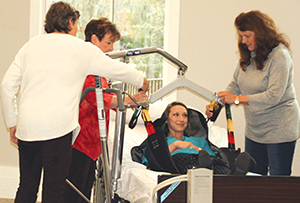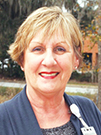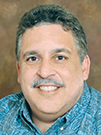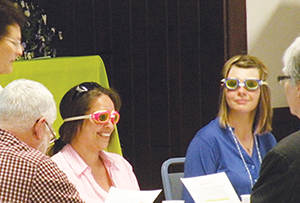By BETSY TAYLOR
Cinda Baker often visits her mother's assisted living residence three times a day to coax her into eating. Baker's mother, 86-year-old Patricia Wilson, has dementia. Baker never knows if her mother will give her an appreciative "thank you" or accuse Baker of poisoning her food. Despite trying her best to care for her mom, Baker described herself as exhausted and at wit's end.

Armstrong State University's Kathy Schaefer, at far left, instructs Pat Panosian and Cinda Baker, at right, in how to use a patient lift during a class at the Edel Caregiver Institute in Savannah, Ga. Physical therapy student Kristen Godfrey acts the part of the patient so the caregivers can practice using the equipment.
In February, Baker enrolled in a new caregiving class at the Edel Caregiver Institute in Savannah, Ga. The institute receives support from St. Joseph's/Candler Health System. The institute is not a ministry of the system.
At the Celeste C. and Robert H. Demere Jr. Center for Living, where the caregiver institute is housed along with other programs to support caregivers and those with life-limiting illness, Baker practiced a new set of skills. Among them, she learned how to position her own foot perpendicularly in front of her mother's feet to keep her mom's legs from sliding out from under her when Baker assists her mom in moving from a seated to a standing position. Her mother can take about a dozen steps with a walker.
Baker learned not to insist when her mother refuses food. Instead, she changes the subject. After a few minutes of distraction, her mother may return to eating.
She learned her mother isn't trying to hurt her feelings with challenging behaviors and remarks. "It used to make me so angry, but now I realize it's the disease," Baker said.
Caregiving 101
Caregivers learn their skills in a classroom designed to look like an apartment. Clinicians use adaptive equipment to show them safe ways to transfer the elderly or ill and ways to assist with feeding, bathing, toileting and dressing.

Hudson

Lazzell

Correa
"This is not the kind of stuff they teach you in a physician's office or hospital, or if a home health aide comes a few times a week," said Kathleen Benton, St. Joseph's/Candler Health System's director of clinical ethics and a board member of the Edel Caregiver Institute.
St. Joseph's/Candler offers $250 scholarships to caregivers taking classes at the center for respite care for their loved one. Caregivers, who fill out an application exhibiting need, can use the money to take a break, or to ensure their ill family member is cared for while they themselves are taking classes at the center.
Paula Hudson, manager of the Edel Caregiver Institute, said the institute came about because Hospice Savannah identified the need to create a "bricks-and-mortar program devoted to caregivers" for hands-on training. Classes and programs at the institute are open to anyone who self-identifies as a caregiver, she said. The Demere center and the caregiver institute opened in September.
Caregivers pay a $100 membership fee to enroll in the institute, though Hudson said no one is turned away because they can't afford the fee. Caregiving classes are taught by clinicians, including a nurse or physical therapist. They usually have eight participants and, so far, 64 caregivers have taken classes. As word spreads about the institute, Hudson expects it will help many more people. The institute will expand to offer online classes and video resources to teach caregiving skills more widely, she said.
Hungry for information
More than 42 million family caregivers nationwide provide unpaid care for aging loved ones each year, so that the person they're caring for can live at home, according to the AARP.
In a 2015 AARP National Caregiving Survey, 1,200 registered voters age 40 and older were interviewed by telephone. Unpaid caregivers in the survey reported feeling stressed and said they found it difficult to take a break, to balance job and family and to exercise regularly due to their caregiving responsibilities. Eight in 10 of those surveyed said having information about caregiver resources and respite care would be "very helpful" or "somewhat helpful" to them in their caregiving role.
"A lot of people don't know what services are available," said Angela Lazzell, development specialist with Presence United Samaritans Medical Center's Foundation of Danville, Ill. Presence Health Foundation's Illiana Alzheimer's Alliance, which assists families in east-central Illinois and western Indiana, hosts a daylong conference every other year. Caregivers learn how to enhance — on cognitive and emotional levels — the lives of those with Alzheimer's disease.
Participants at this year's program, on April 20 in Covington, Ind., will learn ways to communicate with people who have Alzheimer's disease. Instructors will teach stress reduction techniques for care providers and an attorney will explain relevant legal topics including durable power of attorney. About 250 people including nurses, case managers, social workers and, based on past years' attendance, about 80 family members and friend caregivers are expected to attend.
Lazzell said she expects there will be more demand for resources and programs to educate caregivers moving forward. "It's only going to grow as the Baby Boomers age," she noted.
Cultural expectations
Nine in 10 respondents to an AARP national survey published in 2013 said they wanted to age in their homes and communities. That preference is a deep-rooted tradition in Hawaii, where there are strong cultural expectations that adult children will care for their parents as they age, explained Jerry Correa, president and chief executive of Honolulu-based St. Francis Healthcare System of Hawaii.

Adelle Stanley, standing, a consultant on caring for dementia patients, leads caregivers in an exercise about dementia's disorienting effects at the 2014 conference hosted by the Illiana Alzheimer's Alliance of the Presence Health Foundation. This year's conference will be on April 20 in Covington, Ind.
In Hawaii, it's estimated that 154,000 nonprofessional caregivers willingly take on responsibility to provide in-home care to avoid or postpone the need for — and cost of — institutional care, Correa said by email. "Many of these caregivers may not have the knowledge or training to adequately serve as caregivers, and this adds to the stress, guilt and physical and emotional burnout common among caregivers."
The health care system is developing a comprehensive caregiver training program. St. Francis plans to hold outreach workshops in several Oahu communities, beginning this spring, with sessions for caregivers related to infection control, skin care, incontinence management, nutrition, body mechanics, mobility, caregiver stress, safety and activities of daily living. Correa said the system is assembling a team of eldercare specialists and community partners to conduct the hands-on workshops and to develop online instruction.
Honolulu's city and county Elderly Affairs Division and the Aloha United Way Active Aging Initiative are providing initial grants to assist with caregiver education. "We are treading on new, groundbreaking territory, but it's a good feeling to know we're able to support each other on the same journey," Correa said.
By 2035, it's projected that Hawaii's population of adults 60 and older will be nearly 475,000 people, representing about 30 percent of the state's population, with a more than 300 percent increase from 1980 to 2035, he said. Hawaii has begun to address the challenge of scaling care services for the frail elderly to meet the anticipated demand.
St. Francis is working to transform its former hospital campus in Honolulu into the St. Francis Kupuna Village, which includes a skilled nursing facility and plans for an assisted living facility, a senior community center, a dedicated area for an adult day care program and more. Kupuna is Hawaiian for respected elder.
| Keeping low-income, frail elderly in their home At the June Catholic Health Assembly, Rosann Prosser, Presence Home Health's director of clinical operations, will speak on "At the Margins of Society: Helping Homebound Elderly Age in Place." She'll discuss the needs of underserved homebound elderly, ways to help them maintain their dignity and independence and how to collaborate on their care with professional care providers, and with support from volunteers and philanthropic programs. The Presence Health Homebound Elderly Program, with a per
client cost of about $4,000 a year, is much less expensive than many other care programs, according to the health care system. The program includes visits from nurses and social workers, as well as a network of volunteers who help to keep overall costs low. |
Copyright © 2016 by the Catholic Health Association
of the United States
For reprint permission, contact Betty Crosby or call (314) 253-3477.